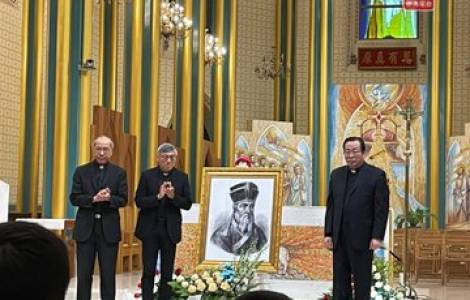
Hong Kong (Agenzia Fides) – Love for our country "is part of the Catholic Church’s teachings", and in the current situation experienced by Catholics in mainland China and Hong Kong it is proper and convenient to pray that the Holy Spirit "will guide us so that we can learn how to love our country and our Church at the same time", writes the Bishop of Hong Kong, the Jesuit Stephen Chow Sau-yan, in an article published in the diocesan weekly The Sunday Examiner to present some eloquent considerations on the sidelines of his recent visit to the diocese of Beijing (see Fides, 17/4/2023). "My Beijing trip taught me to appreciate ecclesiastical and government personnel in the light of a common humanity desiring for ends that encourage further understanding and collaboration".
In his speech, Bishop Chow intends to return to the invocation he had expressed during the Mass he celebrated on the last day of his stay in Beijing. "Let us pray" said the Bishop on that occasion "for the Holy Spirit to guide us so that we can learn how to love our country and our Church at the same time". His words had aroused mixed and even controversial comments, which were re-launched on social networks.
The Bishop introduced his speech with interesting sociological premises: "It is true" writes Stephen Chow "that 'loving our country' is a core value espoused by the Chinese government and the Hong Kong government. Like many of us in Hong Kong, I grew up in colonial Hong Kong, where national sentiment and identity were hardly part of our awareness. Hence, expressing our love for our country was not steeped in our blood, so to speak". Moreover, "What many of us have experienced on the socio-political front in the past decade has further made the shift more difficult. I believe, our Chinese and Hong Kong governments must be well aware of this. We really need the Holy Spirit to teach us to love our country and our Church at the same time".
After these premises, Bishop Chow emphasized that "Love for our country "is part of the Catholic Church’s teachings ". In this regard, the Bishop quotes Jesus' words in Mark's Gospel ("Repay to Caesar what belongs to Caesar and to God what belongs to God", Mk 12:17) and the entire paragraph 2239 of the Catechism of the Church Catholic, which defines the "Duty" of citizens to "contribute along with the civil authorities to the good of society in a spirit of truth, justice, solidarity, and freedom. The love and service of one’s country follow from the duty of gratitude and belong to the order of charity. Submission to legitimate authorities and service of the common good require citizens to fulfil their roles in the life of the political community".
Bishop Chow went on to say that a country's greatest wealth is "without a doubt its people. Hence, loving one’s country means loving those living in the country, especially its citizens and residents. As for the Church, her
greatest asset in this world should not be church buildings but the People of God". Thus, if one does not want to be abstract, it is worth recognizing that "loving our country means the dignity of its people should come first. I believe any responsible government must have the same mission in mind, though the approaches prescribed may vary due to different external factors". People - continues Bishop Chow - can enjoy a ‘good’ life when their government adheres to its mission. The contrary is also true. It is, therefore, desirable to have an opening for dialogue between the government and the Church. For the sake of the country, we should help the government to become better".
Drawing also on his long experience in the field of teaching, Bishop Chow adds considerations that also relate to the ongoing dialogue between the Chinese government and the Catholic Church: "Dialogue assumes respect, empathy and mutual understanding. With this form of communication in place, critical but constructive ‘feedback’ can be better taken and considered. In my experience as an educator and psychologist, being positive and appreciative toward those who can make desirable changes for themselves or others is certainly more sustainable than being negatively critical and threatening most of the time". Dealing with a system or an ideology can certainly lead to problems and complications. But "humanity" remarked the Bishop "has its positive, brighter and loving side that can compensate for or even improve the system. My Beijing trip taught me to appreciate ecclesiastical and government personnel in the light of a common humanity desiring for ends that encourage further understanding and collaboration". Because truth is better revealed "in tension than in ideology. And creativity is often an integral part of the solution when different parties are willing to work on a common ground together".
Bishop Chow adds that we cannot be naïve about "debilitating bureaucracy" and "political interests being some major obstacles to a fruitful dialogue, for it is not about kowtowing but a sharpening of core values in the search for a common approach". (NZ) (Agenzia Fides, 29/4/2013)
 ASIA/VIETNAM - Vietnamese Catholic communities stand alongside women in need to combat mass abortion
ASIA/VIETNAM - Vietnamese Catholic communities stand alongside women in need to combat mass abortion